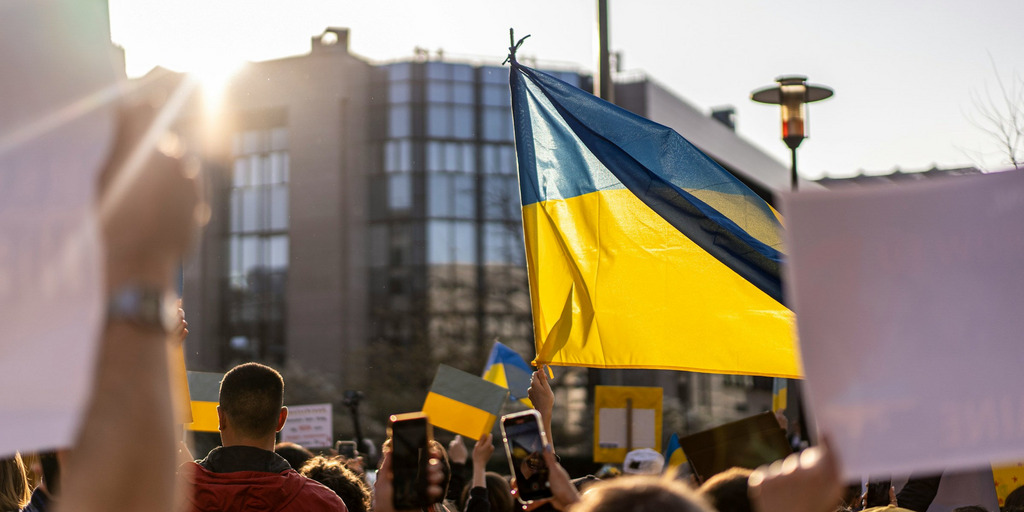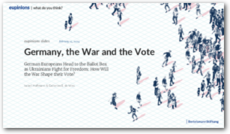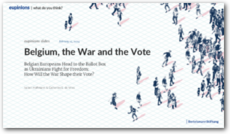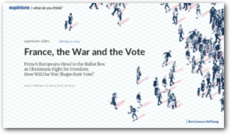Two years after the start of the Russian war of aggression, almost nine out of ten citizens in Germany and Europe believe that the EU needs a common defense policy. A majority of European and German citizens still advocate for political and military support for Ukraine, endorsing arms deliveries, the intake of refugees, and the goal of achieving energy independence from Russia. Most EU citizens also view the accession of Ukraine to the EU positively. However, Germans are becoming more critical of this plan. A few months before the European Parliament election, new eupinions data show what people in Germany and the EU think about Ukraine policy and how attitudes differ depending on which party they support. eupinions is the European opinion research instrument of the Bertelsmann Stiftung. The results are based on a survey conducted in December 2023 of around 13,300 citizens across the EU and 1,800 in Germany.

Anastasiia Krutota / Unsplash - Unsplash-Lizenz, https://unsplash.com/de/lizenz
Two Years of War: European citizens want a common defense policy
In the EU and US election year of 2024, the situation is escalating for Ukraine. While a majority in the EU and Germany still support aid for Ukraine, this backing is mainly among centrist party supporters. However, consensus across all party differences exists for a common European defense policy, with 87% of all EU citizens and 86% of all Germans supporting it.
Content
Low Support among AfD and BSW Supporters
In Germany, arms deliveries to Ukraine are supported mainly by centrist party supporters. The highest approval rate, at 78%, comes from Green supporters. They are followed by SPD supporters at 74%, FDP supporters at 72%, and CDU/CSU supporters at 65%.
The picture is different at the political extremes. Especially supporters of the AfD largely oppose support for Ukraine: 82% are against arms deliveries, 76% against the intake of Ukrainian refugees, and 81% oppose Ukrainian EU accession. Supporters of the Sahra Wagenknecht Alliance (BSW) also show significantly less support for Ukraine than the government parties and the Union. While 56% of all respondents believe that Germany should promote independence from Russian energy even as costs rise, only 42% of BSW supporters endorse this. "We observe stronger support across the EU for European Ukraine policy among those who position themselves politically left or center-left. This is particularly evident in 'hard' issues like arms deliveries," says Isabell Hoffmann, European expert at the Bertelsmann Stiftung and project leader of eupinions. "For example, Bündnis90/Die Grünen have clearly positioned themselves since the start of the war and communicated their stance clearly. In this difficult political situation, they have taken their supporters along. But we also see a 'government bonus' among SPD and FDP supporters. Supporters of government parties tend to support the positions of 'their' government. This effect is also clearly observable in France or Italy." Overall, EU citizens' approval of Ukraine policy has decreased since the outbreak of war, but it still remains at a relatively high level.
Support for Ukrainian EU accession lowest in Germany
Remarkably, support for Ukrainian EU accession is lowest in Germany. It is supported by 60% across the EU. A majority in all other separately surveyed six member states also support it. Only in Germany does a majority oppose Ukrainian EU accession in the coming years. 52% are against it.
Across the EU, we see a strong desire to support Ukraine, but there are also concerns about high costs.
Isabell Hoffmann, European expert at the Bertelsmann Stiftung and project leader of eupinions
In line with this, 69% of German respondents believe that rebuilding Ukraine will be more of an economic burden than an opportunity - the highest value in comparison. These concerns must be taken seriously by both EU and federal politics, especially in the run-up to the European Parliament elections in June, says the expert. "The upcoming elections in the USA and the EU are crucial for Ukraine, but also for the European security order. If there is a change of government in the USA, Europe will face significant security uncertainties. Donald Trump has repeatedly questioned American engagement in Europe. The large majority across the EU for a European defense policy supports political decision-makers in the EU who urgently want to tackle the necessary strengthening of their own security," emphasizes Isabell Hoffmann.











